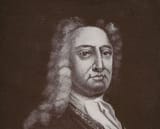Search Results
7/9/2025, 7:34:23 AM
>>509896625
>Stuart Masonic Influence in France
>Through Ambassador Waldegrave and other sources, Whitehall was aware that Charles Radcliffe, the titular Earl of Derwentwater (pictured above), a committed Jacobite, was engaged in securing support for the Stuart cause at the French Court. Derwentwater had fought for James Stuart in the 1715 Jacobite Rising. Captured, he had been tried, found guilty, and sentenced to death, but nonetheless escaped Newgate prison while awaiting execution
>The time and place of Derwentwater’s initiation into freemasonry is uncertain but he co-founded a Masonic lodge in Paris in around 1725 whose membership was drawn mainly from the exiled Jacobite community. He was later installed as Grand Master in France
>Historians take opposing views of Jacobite Freemasonry. Some argue that it functioned as a fraternal association for exiled Jacobite aristocrats and those having similar social status; others hold that it was a well-spring of Stuart conspiracies. It was both, and its members’ political views ranged across a spectrum from the overtly revolutionary to the more moderate. But despite many paying lip-service to the Stuart cause, only a minority were ever active insurgents and for many, if not most, loyalty to James Stuart ebbed and flowed
>Outwardly, French Freemasonry had a similar structure to that in England. One of its principal functions was to provide a forum for gentlemanly association and membership of the ‘right’ lodge validated one’s status in Society
>Stuart Masonic Influence in France
>Through Ambassador Waldegrave and other sources, Whitehall was aware that Charles Radcliffe, the titular Earl of Derwentwater (pictured above), a committed Jacobite, was engaged in securing support for the Stuart cause at the French Court. Derwentwater had fought for James Stuart in the 1715 Jacobite Rising. Captured, he had been tried, found guilty, and sentenced to death, but nonetheless escaped Newgate prison while awaiting execution
>The time and place of Derwentwater’s initiation into freemasonry is uncertain but he co-founded a Masonic lodge in Paris in around 1725 whose membership was drawn mainly from the exiled Jacobite community. He was later installed as Grand Master in France
>Historians take opposing views of Jacobite Freemasonry. Some argue that it functioned as a fraternal association for exiled Jacobite aristocrats and those having similar social status; others hold that it was a well-spring of Stuart conspiracies. It was both, and its members’ political views ranged across a spectrum from the overtly revolutionary to the more moderate. But despite many paying lip-service to the Stuart cause, only a minority were ever active insurgents and for many, if not most, loyalty to James Stuart ebbed and flowed
>Outwardly, French Freemasonry had a similar structure to that in England. One of its principal functions was to provide a forum for gentlemanly association and membership of the ‘right’ lodge validated one’s status in Society
Page 1
